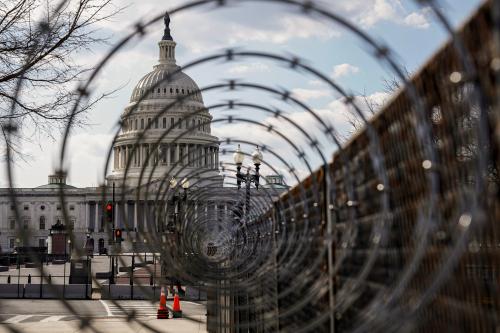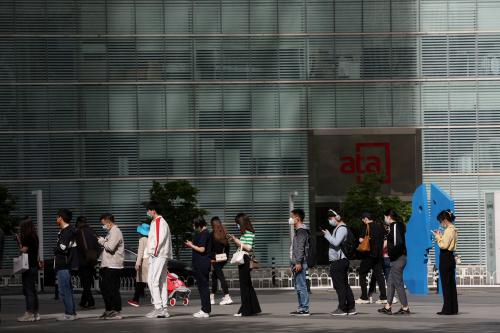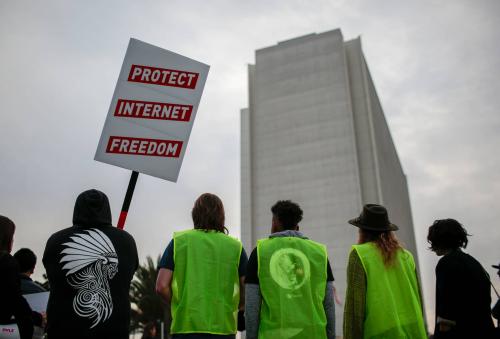Executive Summary
As the war in Ukraine unfolds, Russian propaganda about the conflict has gotten a boost from a friendly source: government officials and state media out of Beijing. In multiple languages and regions around the world, China’s “wolf warrior” diplomats and state media routinely amplify Kremlin conspiracy theories rationalizing President Vladimir Putin’s invasion, and undermining the credibility and appeal of the United States, NATO, and independent media — even as China declines to endorse the Kremlin’s adventurism wholesale. This spring, for example, China’s messengers promoted the baseless Russian claim that the United States has been supporting a biological weapons program in Ukraine — at times, more aggressively than Russia itself.
Because Russian state media have been de-amplified or banned by multiple Western social media platforms, Beijing’s messaging could play an outsized role in channeling Kremlin talking points to audiences around the world.
These narratives do not just spread on social media. Beijing’s state-funded publishers have considerable success in a domain that has received comparatively little attention: search results.
For months, our team has been tracking how China has exploited search engine results on Xinjiang and COVID-19, two subjects that are geopolitically salient to Beijing — Xinjiang, because the Chinese government seeks to push back on condemnation of its rights record; COVID-19, because it seeks to deflect criticism for its early mishandling of the pandemic. In both cases, Beijing is quite focused on positioning itself as a responsible global leader and softening perceptions to the contrary.
To evaluate these concerns, we compiled daily data over a 120-day period on 12 terms related to Xinjiang and COVID-19 from five different sources: (1) Google Search; (2) Google News; (3) Bing Search; (4) Bing News; and (5) YouTube.
We found that:
- Chinese state media are remarkably effective at influencing the content returned for the term “Xinjiang” across several search types. “Xinjiang,” which is among the most neutral terms in our data set, regularly returned state-backed content across news searches, with at least one Chinese state-backed news outlet appearing in the top 10 results in 88% of searches (106 out of 120 days searched). On YouTube, state media appeared among the top 10 results in searches for “Xinjiang” in 98% of searches (118 out of 120 days searched).
- Consistent with past research, search results for conspiratorial terms across all search types yielded a high volume of state-driven content. Take, for example, the term “Fort Detrick” — a military base in Maryland that housed the United States’ biological weapons program from 1943 to 1969 and has become a central figure in China’s efforts to spread disinformation about the origins of the coronavirus outbreak. On YouTube, searches for “Fort Detrick’’ regularly returned state-backed content, with 619 observations of videos from Chinese state media outlets appearing in the top 10 search results during our study (or around five per day). Similarly, “Unit 731,” a biological and chemical weapons research unit located in Japan-occupied China during World War II and a subplot in China’s efforts to connect the origins of the coronavirus outbreak to Fort Detrick, appeared on the first page of search results for news searches every single day of data collection.
- Both news search (Google News and Bing News) and YouTube search are much more likely to disseminate Chinese state media than web search. Chinese state media accounted for roughly 22% of the observed pages and 25% of observed channels in search results for queried topics related to Xinjiang and the origins of the coronavirus on news and YouTube searches, respectively. By comparison, Chinese state media accounted for only 6% of results for the same queried topics on Google and Bing web search.
- Terms tied to the pandemic were less likely to return state-backed content than terms tied to Xinjiang, likely due to the considerable attention platforms have paid to moderating COVID-19 content.
- Because of China’s extensive content hosting and influencer arrangements, our research likely underestimates the prevalence and prominence of Chinese state media in search results, given the challenges of identifying this content republished in seemingly independent sources. In our dataset, at least 19 different sources that are not officially affiliated with the Chinese government but regularly republished Chinese state media content verbatim (e.g., the Helsinki Times) appeared in top search results. Including observations from only those 19 sources would increase the total number of Chinese state media occurrences in search results by nearly 10%.
To address these findings, we propose that companies:
- Address hosting, reposting, and syndication, recognizing that agreements between international news outlets and Chinese state media are a significant avenue for the proliferation of Beijing’s narratives, including misleading and conspiratorial content. Potential remedies include clear labels and links to the original source.
- Expand the practice of labeling the websites of state media, agencies, and officials in search results, which provides important context to users.
- Provide notice to users when result quality is suspect, as Google has done for breaking news events, including for searches for contested terms or topics that are a battleground for search result dominance.
- Provide information on how ranking decisions regarding state content are assessed and made — including whether factors that lead to deranking (as in the case of Russian state media and Google) may have implications for content produced by other states.
- Contribute to public education about how engines find, rank, and surface content. User trust in engines like Google remains high, but there is little evidence that users have a strong understanding of the factors that determine results.
- Collaborate and share information with other search engines, as they have in the past, to improve the performance of their technologies. The goal should not necessarily be the formation of a new institution or mechanism, but rather information exchange on how to address common vulnerabilities.
Other actors can play a role too. In particular:
- Content creators who cover issues related to or of importance to Beijing — including research organizations, government officials, and activists — should develop an understanding of how audiences are searching for their stories and maintain awareness of efforts to subvert them. Considering audience behavior when tagging, using keywords, and developing communication strategies can contribute to countering misleading stories.
- Authoritative outlets should reconsider syndication agreements with state media that do not have appropriate controls to ensure editorial independence. At a minimum, they should enhance disclosure and labels to better inform audiences.
By taking these steps, companies, content creators, and authoritative outlets can ensure that Beijing is not able to dominate search results for terms related to its geopolitical interests, and that users have the information they need to contextualize the propaganda they encounter.
-
Acknowledgements and disclosures
The authors would like to thank Francesca Tripodi and Jenny Fan for sharing their insights and research, Chris Meserole for his invaluable feedback, Joseph Bodnar for his contributions to editing, and Rachel Slattery for layout. The authors are also grateful to NewsGuard, which provided data to support our analysis.










